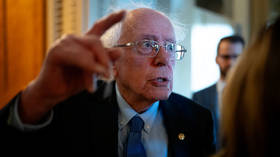Comey admits FBI failed to verify Steele Dossier it used to obtain a spy warrant on Trump's aide
Former FBI Director James Comey has admitted the Steele dossier was still uncorroborated by the FBI at the time he left the bureau. The infamous dossier was used by the FBI to monitor Trump aide Carter Page.
The House Oversight Committee has released a 235-page transcript of Comey's grilling 24 hours after the former FBI director was questioned by lawmakers on the Capitol Hill. While Comey, who was fired by Trump in May 2017, tried hard not to spill the beans, he let out one startling confession – the FBI did not verify the scandalous dossier compiled by ex-British spy Christopher Steele before it went to the Foreign Intelligence Surveillance Court where it was used to obtain a warrant on Trump's former campaign advisor Carter Page.
READ MORE: FISA abuse accusations ‘nonsense’ says Comey, dodging dossier question
Responding to Rep. Ratcliffe, (R-Texas), Comey admitted that before signing off on the FISA warrant in October 2016, he repeatedly referred to the dossier as lacking credibility, but said that he did not know that he "was referring to all of it."
"Maybe I was, but I had in mind some particular portions of it that were salacious and unverified," Comey said during his closed-door testimony.
That, however, did not stop Comey from submitting the dossier to the FISA court as evidence of the Trump campaign's alleged ties to Russia.
Describing Steele as "a reliable source with a track record," Comey admitted that his work was not double-checked by the FBI.
"But what I understand by verified is we then try to replicate the source information so that it becomes FBI investigation and our conclusions rather than a reliable source's. That's what I understand it, the difference to be. And that work wasn't completed by the time I left in May of 2017, to my knowledge," Comey said.
The Nunes memo, released by the Republican-controlled House Intelligence Committee in February, has revealed that Steele was dumped as an FBI source over his leaks to the media. The FBI documents released in August confirm that the FBI terminated formal relations with Steele a week before the 2016 elections.
According to the memo, the dossier "formed an essential part" of the warrant obtained from a FISA court on October 21, 2016.
While the transcript of Comey's testimony has 235 pages in total, many were disappointed with the way Comey, who appeared to have an incredibly weak memory as he stood before the committee, dodged many of the critical questions.
Rep. Jim Jordan (R-Ohio) counted that Comey answered "don't know" a whopping 166 times, "I don't remember" – 71 times and "I don't' recall" – 8 times.
James Comey:“I don’t recall”—8 times“I don’t remember”—71 times“I don’t know”—166 timesAND he said he didn’t know that Christopher Steele was passing information to Bruce Ohr, who was giving it to the FBI.
— Rep. Jim Jordan (@Jim_Jordan) December 8, 2018
During his questioning, Comey reiterated that the dossier did not trigger the investigation into the Trump campaign's supposed ties to Russia. The former director said that it was a meeting between former Trump campaign foreign policy aide George Papadopoulos and London-based professor Joseph Mifsud in March 2016 that kickstarted the investigation. Mifsud allegedly told Papadopoulos of the emails stolen from Clinton's Campaign by 'Russian hackers.'
"It was weeks or months later that the so-called Steele dossier came to our attention," Comey said.
Comey previously dismissed accusations that the bureau did not follow procedure in obtaining a warrant on Page as "nonsense".
"The notion that FISA was abused here is nonsense," Comey said while leaving the Capitol Hill on Friday following his testimony.
The explanation, however, did not sit well with Republicans. Lindsey Graham (R-South Carolina) who is chair-designate of the Senate Judiciary Committee, tweeted that "the process used to obtain a FISA warrant – and its multiple renewals – against Carter Page should disturb every American."
"I look forward to having an in-depth discussion with former FBI Director Comey about his assertion that challenges against the FISA warrant process – based on the Steele dossier – are 'nonsense,'" he added.
In my view the process used to obtain a FISA warrant – and its multiple renewals – against Carter Page should disturb every American. I intend to get to the bottom of what happened if I am Chairman of the Senate Judiciary Committee.
— Lindsey Graham (@LindseyGrahamSC) December 8, 2018
Like this story? Share it with a friend!













